
Issues related to cooperation between Kazakhstan and Tajikistan in the field of digitalization were discussed in Dushanbe on April 3. During a meeting between the Ambassador of Kazakhstan to Tajikistan, Valikhan Turekhanov, and the head of the Agency for Innovation and Digital Technologies under the President of Tajikistan, Khurshed Mirzo, important topics such as the digitalization of government services, the implementation of artificial intelligence, and the development of the fintech sector were covered.
The Agency for Innovation and Digital Technologies reports that during the meeting, Valikhan Turekhanov expressed gratitude to the Tajik side for its active participation in events organized by Kazakhstan in the field of digitalization, highlighting Tajikistan's contribution to the international forum “Digital Almaty 2025: Industrial AI: Technologies for a New Era,” which took place in Almaty in February 2025. This forum became an important stage in the exchange of experiences between the two countries in the use of artificial intelligence technologies and digital innovations.
In turn, Khurshed Mirzo highly appreciated the cooperation in training Tajik specialists in leading IT schools in Kazakhstan, emphasizing the importance of such initiatives for the development of digital technologies in Tajikistan.
Tajikistan is actively developing e-government, and cooperation with Kazakhstan in this direction is a key component. In 2024, Kazakhstan supported Tajikistan in the development and implementation of the eGOV and Smart Bridge systems, which are part of a broader program for the digitalization of government services in both countries. As part of these efforts, the two sides signed a memorandum of cooperation, which includes the creation of digital infrastructure, the development of startups, and the establishment of technology parks.
Cooperation in the field of digital technologies is not limited to just government projects. It is expected that in 2025 the countries will continue to deepen their partnership in the fields of transport technologies, telecommunications, and agriculture, with an emphasis on the digitalization of these sectors. Special attention will be paid to joint efforts to modernize information technologies and improve the quality of government services through digitalization.
The past year was a breakthrough for bilateral relations, including in the economic sphere, where trade turnover between the two countries grew by 15%. Special significance is attached to the growth of investment cooperation, covering key sectors such as telecommunications, energy, and finance.
Against the backdrop of successful steps in digitalization, the countries are preparing to further deepen their partnership, which promises new opportunities for the development of the economy and technologies in Central Asia.




